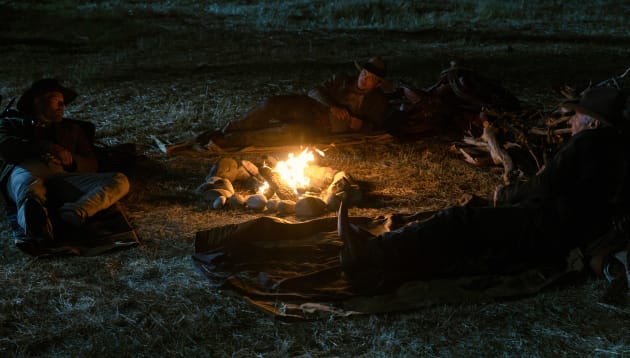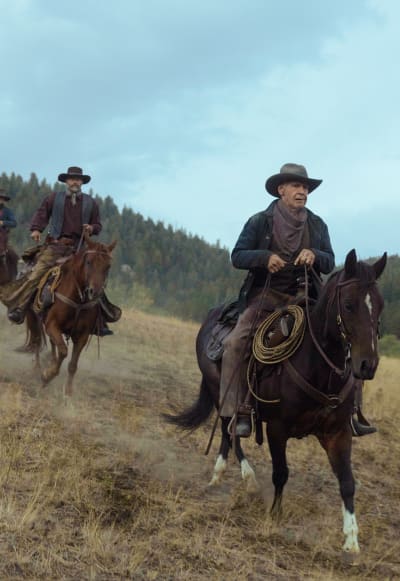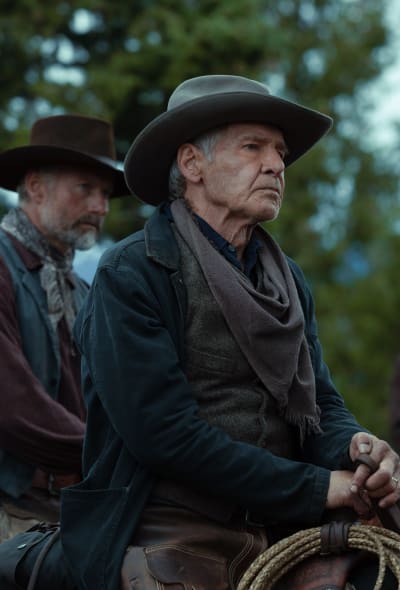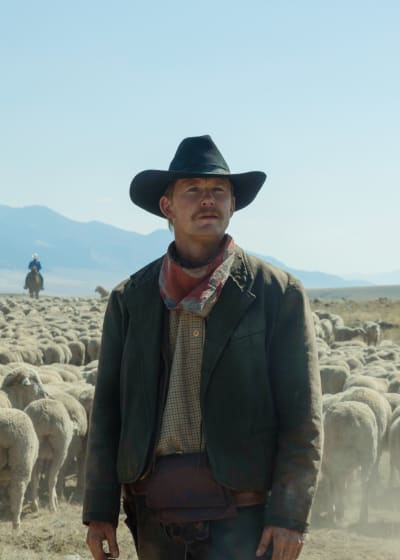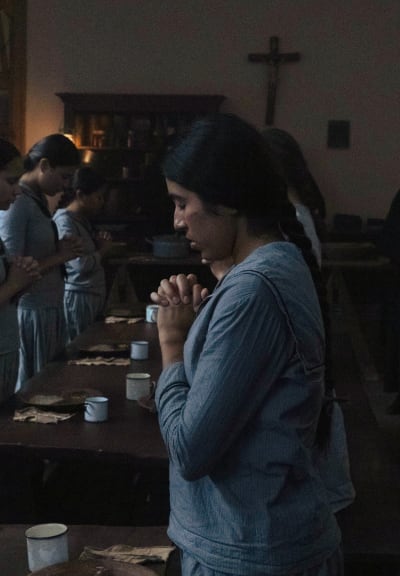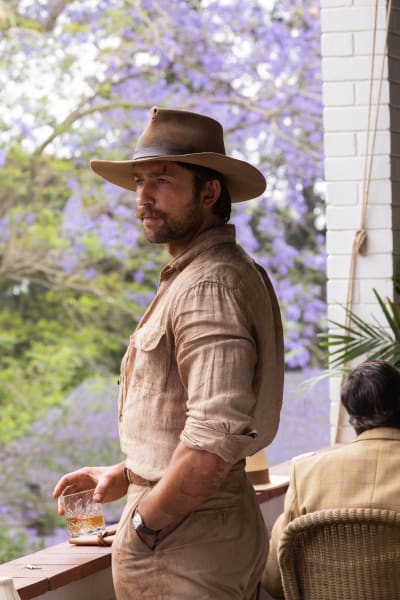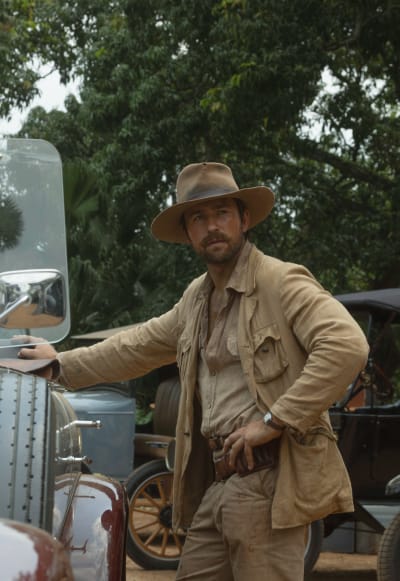More things happened on 1923 Season 1 Episode 2. If that doesn’t sound like a rousing endorsement, that’s because it’s not.
The series is still all over the place, and other than introducing a new generation of Duttons just to introduce them, it feels aimless and unsure of its direction.
It’s possible there are too many characters and diverse plots for 1923 to be a success.
So far, what we’ve learned is where all of what Yellowstone’s John Dutton lives by, and it comes directly from Jacob. It’s possible the same lessons were bandied about on 1883, but since there was a solid plan to get the Duttons to Montana, it landed differently.
The hour picked up right after Jack found the sheep on the other side of the mountain, and Banner’s guys just started shooting, leaving Jack pinned under his dead horse and the next target.
So, Jacob taught Banner and his men a lesson. It was a harsh lesson and one that four of them didn’t survive.
Jack: Think any of ’em made it?
Jacob: Depends on the loyalty of their horse. Give a man enough time, he can figure his way out of anything. I figure a few will make it. I hope a few do.
Jack: Why?
Jacob: Someday, you’re gonna run this place, and for your son to someday run it, too, you gotta understand what your ranch’s greatest enemy is. It’s not wolves or drought or blizzards or Texas fever. It’s other men. Men will choose to take what you built rather than try to build it for himself. Every civilization in this world built on top of the one they conquered. You go to Rome or Jerusalem or Paris, France, and it’s cities stacked on top of towns, stacked on top of villages, stacked on top of one man’s house built on top of one man’s cave. You wish it wasn’t so, but it is. Your enemy’s got to be so terrified that their fear is greater than their greed. I gave those men a chance cause I wanted them to tell the world what happened when they crossed me.
But it’s not something we haven’t heard before. We’ve heard it on Yellowstone in the same capacity when John used another such scenario as a teaching moment.
It’s damned odd to think that only 100 years ago, vigilante justice was meted out without consequence. No, you don’t tread on another man’s land, but you hope for some leeway when the world is dying around you. Jacob’s not into leeway.
What I find particularly interesting is how this is a product of a bygone era that the Yellowstone universe writers not only understand but care enough about to bring into the present.
In this universe, it is how it was and how it remains. It’s as if since ranching is hard work, they get to pick which laws to abide by. It’s kind of fun on Yellowstone because the show itself is attuned to the comedy that can arise from these perilous situations.
The Yellowstone of 1823 is far more serious, and adding Teonna Rainwater’s story to the mix sucks any of the fun out of what’s happening in Montana.
Teonna’s story is worth telling, as unpleasant as it is, but it would be better served in a spinoff dedicated to the Native Americans so that these two worlds don’t have to coexist.
Slapped on top of those two plotlines is Spencer, the famous Dutton who hunts maneaters, getting all of the girls’ panties in a twist.
The three stories don’t intersect in any way that I can ascertain of yet, and they’re too tonally different to stitch a good yarn through the first two hours of 1923 Season 1 (which will be its only season, albeit longer than what we’re used to in the universe).
John Dutton, Sr. and his wife Emma are still little more than filler characters, which seems unfair. But I guess some characters just don’t merit a dedicated story and must live within the stories of others.
Yellowstone has worked because every story in some way abuts the Duttons’ and the Yellowstone ranch is home base. It’s the touchstone around which every other story spins.
Here, the Yellowstone house is a big, empty box so lonely that Cara would rather cradle a rifle outside than feel miserable within it.
Ranching in Montana at that time required men and women to live somewhat differently, with men on the range and women caring for the hearth, but if there’s no hearth to care for, they are left with little to do worth mentioning.
Teonna’s story is too difficult to address. What is there to say other than how horribly the Native American young women (and all Native Americans) were treated?
There hasn’t been one thing that has happened to her that lends itself to any discussion other than NO. That should never have happened, and it’s embarrassing to have built the country with that abusive behavior.
Yet, that’s pretty much what Jacob was detailing in his speech about how the world came to be. That is how it was, and although we know we should do better, the odds of that changing are slim, even in the present.
Conquer, assimilate, and thrive.
Maybe that’s why Spencer’s experience in Africa worked so much better this time around. He’s far away from the trials in Montana and has become somewhat of a myth for how he stares death in the face repeatedly.
Like Elsa was so keenly aware, Spencer knows that you never feel as alive as you do when facing death. It kicks the adrenaline into overdrive, and for just a moment, you know why you exist.
Spencer doesn’t take life for granted and refuses to allow others to do so, either. When his friend was killed, he wanted the man responsible to feel shame for his part in what happened.
Spencer isn’t just conquering death regularly, he’s going through something deeper as a result of being at war. He’s trying to understand what it all means.
It makes him very interesting and quite sexy, as Alexandra discovered.
Their meeting was fate, and their attraction was electric.
The yearning looks on their faces as they gazed across crowds and peered directly into each other’s eyes was in welcome contrast to the death and torture occurring in Montana.
Theirs is an adventure I want to watch. Interestingly, neither of them nor the African location are found in the 1923 key art. It’s as if they really are on a show all their own.
But what about you? Is there one part of the 1923 story that you’re more interested in than the others? Do three disparate storylines work?
Share your thoughts below, and then get out of here and enjoy Christmas Day!!
Carissa Pavlica is the managing editor and a staff writer and critic for TV Fanatic. She’s a member of the Critic’s Choice Association, enjoys mentoring writers, conversing with cats, and passionately discussing the nuances of television and film with anyone who will listen. Follow her on Twitter and email her here at TV Fanatic.
